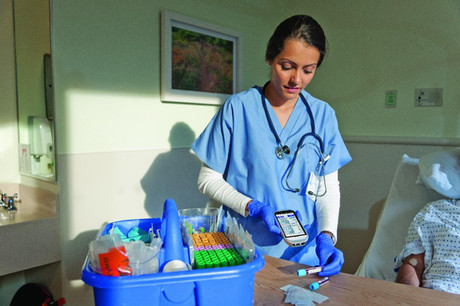The Future of Healthcare – Why technology is key to improving patient outcomes
Friday, 09 September, 2016

The Internet of Things (IoT) has radical importance for the future of medical technology.
Currently, nurses spend 35% of their time on documentation, 20% on team communications and only 19% on patient care activities2. But with the right combination of interconnected, online-capable devices, numerous common frustrations of modern medical care can be addressed much more easily – and some even eliminated altogether.
Life-threatening mistakes can happen due to wrong medication delivery, wrong diagnosis and inaccurate patient identification.
With the right technology in place, access can be provided to vital data, creating devices that are simple enough for anyone to use and ultimately take control of their own health care.
Centralised data means patients no longer have to repeat their stories to numerous healthcare professionals. All staff involved in patient care can access a patient’s notes immediately. The IoT is empowering patients, allowing them more control over their own health care. As more patients are able to treat themselves outside of hospitals, this will reduce the strain on healthcare services.

Older patients with long-term health conditions can monitor themselves remotely; people with diabetes can monitor their own progress. Nurses could know immediately when a patient slips and falls, be able to find a critical clinician in the moment of need, and put an end to time-draining searches for an essential piece of medical equipment. New cases could be properly triaged, enabling medical staff to focus on the most urgent cases first. Perhaps most crucially, such devices could eventually aid in providing doctors and staff with easy access to patient’s medical records, rather than subjecting the patient to multiple rounds of inquiry and needless paperwork as they are transferred from one department to another. Ultimately, the adoption of such technology will lead to a better standard of patient care – and in turn, better patient outcomes.
These applications are only a small sample of the potential benefits to the medical community, too. Tech-based solutions are likely to expand even further the coming years, encompassing everything from procedural management through to remote management of patients’ medical devices – the Internet of Things may already be here, but only the tip of the iceberg has yet been revealed.
Zebra Technologies offer a fully integrated healthcare solution developed by experts to reach new levels of efficiency, accuracy and patient safety. This includes:
- Real-time visibility into patient records, specimens, medications, equipment and staff whereabouts, from the time a patient is admitted to the time they sign their discharge;
- The ability to capture, analyse, track, share and act on that real-time data from anywhere and at any time;
- Helping safeguard patient, staff and asset safety
Need help implementing tomorrow’s tech trends today? To find out more on how Zebra’s innovative solutions help healthcare organisations achieve an unprecedented level of efficiency, as well improve quality of care, please visit zebra.com/healthcare or contact Amy Kwong on akwong@zebra.com

Sources: 1 IDC Digital Universe Study
2 Kaiser Permanente
Remote laundries target preventable disease in NT communities
A new community laundry has launched in Borroloola, part of a program seeking to curb preventable...
Eye care partnership looks to support First Nations optometrists
A new scholarship initiative will support Aboriginal and/or Torres Strait Islander optometrists...
A Day in the Life of a mobile optometrist
Linda Nguyen is the owner and founder of mobile optometrist practice Care Optometry and was a...

![[New Zealand] Transform from Security Awareness to a Security Culture: A Vital Shift for SMB Healthcare — Webinar](https://d1v1e13ebw3o15.cloudfront.net/data/89856/wfmedia_thumb/..jpg)
![[Australia] Transform from Security Awareness to a Security Culture: A Vital Shift for SMB Healthcare — Webinar](https://d1v1e13ebw3o15.cloudfront.net/data/89855/wfmedia_thumb/..jpg)




